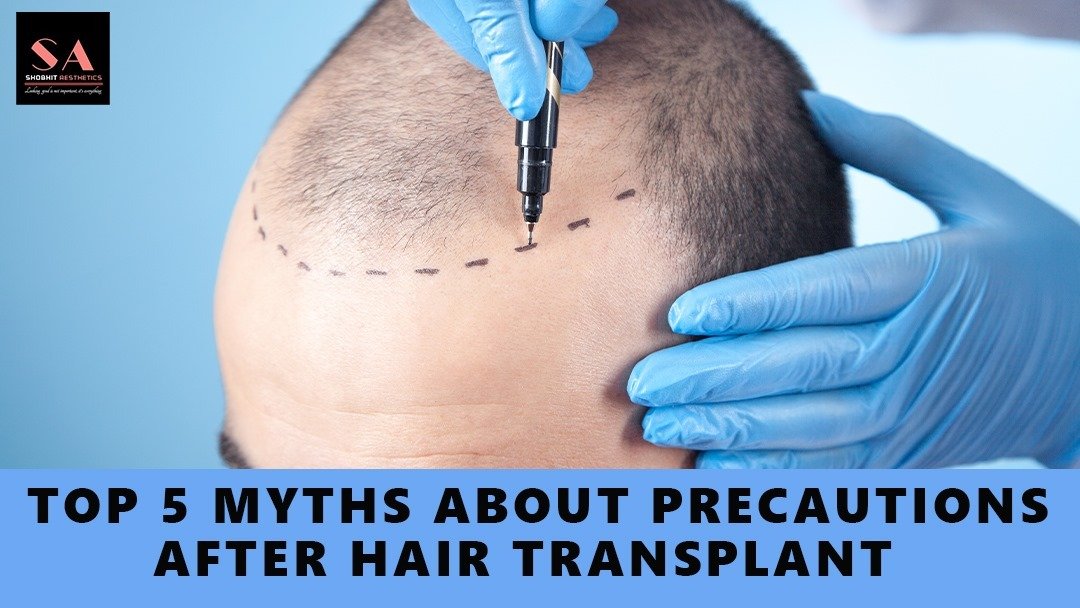
Think of a hair transplant as a new lease in life for those grappling with hair loss. Both follicular unit transplantation (FUT) and follicular unit extraction (FUE) users know that taking care after surgery is critical for hair restoration to stick. But false gossip can make the recovery process tricky to understand. In this read, we'll correct the five biggest mix-ups about what to do after the best hair transplant in Delhi, giving you real, helpful pointers for prime post-surgery care.
Myth 1: You Can’t Wash Your Hair for Weeks After a Transplant
The common belief that you shouldn't wash your hair for a long time after a hair transplant is a myth. Some folks worry that washing might unsettle the newly shifted hair follicles, changing the surgery results. This false information stirs needless concern, especially for those who value cleanliness and hygiene.
Fact: No need to shun hair wash for weeks post-transplant. Surgeons typically suggest softly cleaning your scalp after several days. Right washing is crucial for eliminating blood clots, dead skin, and surplus oil built up on your scalp. They'll tell you to choose a light, medical-quality shampoo. Wash your hair with tepid water, patting gently. If you stick to this guidance, your scalp stays clean, and the grafts remain safe.
Myth 2: You Should Avoid Physical Activity for Months
Many people mistakenly think that after getting the best hair transplant in Delhi, they need to avoid all physical activities for months on end. This belief holds that any exercise could boost blood flow to your head, possibly making the new hair grafts to shake loose or interfere with the healing.
Fact: Yes, after surgery, you shouldn't rush into tough workouts. But that doesn't mean you're stuck on the couch for ages. For about two weeks, say no to things like lifting weights, jogging, or any action that makes your heart pound or sweat pour. But don't worry! After that short rest period, you can slowly bring back lighter activities. A gentle stroll or some easy stretches could do the trick. Got questions? Your surgeon's the one to ask for the best advice on kick-starting your exercise schedule again safely.
Myth 3: Wearing a Hat Will Ruin Your Transplant
Hats and hair transplants might seem like a sour mix to some folks. They worry a hat could damage fresh grafts and ruin the transplant's effectiveness. So, they skip head covers — even when they've got to safeguard their scalp against weather and such.
Fact: It's okay to put on a hat after getting a hair transplant in Delhi. Just make sure you listen to your surgeon on when and what kind to wear. Doctors usually say to wait a few days after the operation before wearing headgear. This gives the new hair time to settle in. Choose a soft, loose hat when you do wear one. It shouldn't squash the transplant spot. Hats can also shield you from the sun, and staying out of the sun is key while your body heals.
Myth 4: The Transplanted Hair Falls Out Permanently
There's a common myth that stirs up needless worry: the notion that all transplanted hair will shed and never return. This false belief can lead patients to think their operation was unsuccessful when they notice hair loss a few weeks following their surgery.
Fact: Don't worry if you see hair falling out after a Hair Transplant Treatment in Delhi. It's natural and part of the hair's cycle. You might hear this called "shock loss," and it usually starts two to eight weeks after the surgery. The transplanted hair follicles take a break, shedding the first set of hairs. But soon, new hair starts to invade those spots. Count a few months for this to happen. You’ll see the full effect of the transplant after 12 to 18 months. So, losing hair at first is temporary. Look forward to stronger, fuller hair in the future!
Myth 5: You Don’t Need to Worry About Sun Exposure After the Transplant
It's not uncommon for folks to think that sunlight doesn't affect hair transplant recovery. They assume, after the procedure, they can just get back to regular outdoor fun without a care.
Fact: Let me tell you, getting a bit too much sun after surgery isn't a good idea. Especially during those early healing weeks. Your head's skin, it'll be like a sensitive baby. UV rays from the sun? They can make your skin annoyed, turn it red, and they can hurt your new hair grafts. Stay away from direct sunlight for about a month after the transplant, okay? And if you have to go out, put on a hat. Or maybe use some sunscreen on your scalp if your doctor says it's cool. Protecting yourself from the sun will help your grafts heal just right and avoid any nasty scars or weird color changes.
Additional Precautions to Consider After a Hair Transplant
Apart from debunking myths, it’s essential to highlight a few key precautions you should follow after your hair transplant in Delhi to ensure optimal results:
Sleep Position: For the first few days after your procedure, try to sleep with your head propped up at a 45-degree tilt. This tactic can help keep swelling down and stops extra pressure from getting on those grafts.
Hydration and Diet: Drinking plenty of water and eating a diet full of vitamins and minerals helps heal faster. Stuff like zinc, vitamin C, and biotin boost hair growth and fix tissues.
Avoid Smoking and Alcohol: Smoking makes your blood vessels tighter, decreasing the oxygen reaching your head. This affects the healing of wounds. Likewise, alcohol can zap your body's hydration and mess up blood flow. It’s recommended to stay away from both cigarettes and alcohol for a minimum of two weeks following your transplant.
Medications: Listen to your doctor's advice about your medicines. They might give you antibiotics to stop you from getting sick and drugs to lower puffiness. Always take medicine the right way. Don't use ones from the shop that your doctor didn't say yes to.
Patience: The journey of hair growth is steady but slow, showing its complete effects from your transplant after about a year or longer. Staying calm and abiding by your surgeon's guidelines for post-treatment care gives you the highest chance for great results.
Getting the truth about after-care for hair transplants can make your healing process smooth. Be careful, false warnings can bring extra worry, but sticking to your doctor's advice will help you heal really well and have a good outcome. Keep in mind, the best hair transplant in Delhi isn’t a quick fix but a long-term commitment to looking better and feeling better about yourself. Taking care in recovering is essential. Ignore these five common myths. Instead, pay attention to your own after-care plan for a full and fantastic hair recovery.
Thinking about a hair transplant? Or maybe you've just had one? Always talk with the best hair transplant surgeon in Delhi for customized advice. They're there to bust those myths you've heard and give you the reliable guidance you need for a great result. Book a consultation today for the best hair transplant in Delhi with Shobhit Aesthetics.


